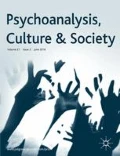Abstract
This article posits that social trauma is to be understood from a social psychoanalytic perspective that takes account of the complex interface and mutual impact of social forces and unconscious dynamics. Its argument, that politics and psychology are inevitably interwoven as the foundation of subjectivity, is explored through an autobiographical journey that inexorably took the author from political activism to psychoanalysis. The author’s personal, professional and political encounter with the traumatogenic conditions of Latin American state terror, and her involvement in a progressive movement within psychoanalysis that aligns the profession with activist struggles on behalf of social justice, is proposed as a significant model for psychoanalysts in the Global North as well as the Global South.
Similar content being viewed by others
References
Bauman, Z. (2007) Liquid Fear. Cambridge, UK: Polity Press.
Blumenkranz, C. et al (2011) Occupy!: Scenes from Occupied America. London: Verso.
Boggs, C. (1984) The Two Revolutions: Antonio Gramsci and the Dilemmas of Western Marxism. Cambride, UK: South End Press.
Boulanger, G. (2007) Wounded by Reality: Understanding and Treating Adult Onset Trauma. Mahwah, NJ: Analytic Press.
Bray, M.W. (2012) The Making of Chile: With Poems and Guns: A personal recollection. http://lap.sagepub.com/search/results?fulltext=Chile%3A+With+Poems+and+Guns&x=13&y=8&submit=yes&journal_set=splap&src=selected&andorexactfulltext=and online or LAP, accessed 2 August 2012.
Damousi, J. and Plotkin, M.B. (eds.) (2012) Psychoanalysis and Politics. New York: Oxford University Press.
Feitlowitz, M. (1998) A Lexicon of Terror: Argentina and the Legacies of Torture. New York: Oxford University Press.
Gitlin, T. (2012) Occupy Nation: The Roots, the Spirit, and the Promise of Occupy Wall Street. New York: It Books.
Hollander, N.C. (1974) La mujer: esclava de la historia o historia de esclava? Buenos Aires: La Pléyade.
Hollander, N.C. (1990) Buenos aires, Argentina: Latin Mecca of psychoanalysis. Social Research 57 (4): 889–919.
Hollander, N.C. (1999) The individual and the transitional space of authoritarian society. Mind and Human Interaction 10 (2): 98–109.
Hollander, N.C. (2004) (Editor of special issue) Argentine economic meltdown: Trauma and social resistance. Mind and Human Interaction 13 (4): 161–238.
Hollander, N.C. (2006) Trauma, ideology, and the future of democracy. International Journal of Applied Psychoanalytic Studies 3 (2): 156–67.
Hollander, N.C. (2007) Love in a Time of Hate: Liberation Psychology in Latin America. New York: Other Books.
Hollander, N.C. (2010a) Uprooted Minds: Surviving the Politics of Terror in the Americas. New York: Routledge.
Hollander, N.C. (2010b) The gendering of human rights: Women and the Latin American terrorist state. In: A. Harris and S. Botticelli (eds.) First Do No Harm: The Paradoxical Encounters of Psychoanalysis, Warmaking, and Resistance. New York: Routledge, pp. 279–301.
Hollander, N.C. (2011) Psycho-political dynamics of the bystander in Luis Puenzo's “The official story”. special issue: Witnessing, hiding, bystanding – Contributions from film to their social consequences. International Journal of Applied Psychoanalytic Studies 8 (2): 147–161.
Jacoby, R. (1983) The Repression of Psychoanalysis: Otto Fenichel and the Freudians. New York: Basic Books.
Klare, M. and Kornbluth, P. (eds.) (1998) Low Intensity Warfare: Counterinsurgency, Proinsurgency and Antiterrorism in the Eighties. New York: Pantheon Books.
Langer, M. (1971) Psícoanalisis y/O revolución social. Cuestionamos I: 261–284.
Langer, M. (1981) Memoria, historia y diálogo psicoanalítico. Mexico City: Folios Ediciones.
Langer, M. and Maldonado, I. (1983) Unpublished manuscript.
Layton, L., Hollander, N.C. and Gutwill, S. (eds.) (2006) Psychoanalysis, Class and Politics: Encounters in the Clinical Setting. New York: Routledge.
Laplanche, J. (1999a) Essays on Otherness. New York: Routledge.
Laplanche, J. (1999b) The Unconscious and the Id. London: Rebus Press.
Reisner, S. (2010) From resistance to resistance: A narrative of psychoanalytic activism. In: A. Harris and S. Botticelli (eds.) First Do No Harm: The Paradoxical Encounters of Psychoanalysis, Warmaking, and Resistance. New York: Routledge, pp. 107–141.
Žižek, S. (1989) The Sublime Object of Ideology. London: Verso.
Žižek, S. (2002) Welcome to the Desert of the Real. London: Verso.
Author information
Authors and Affiliations
Rights and permissions
About this article
Cite this article
Hollander, N. Social trauma, politics and psychoanalysis: A personal narrative. Psychoanal Cult Soc 18, 167–183 (2013). https://doi.org/10.1057/pcs.2013.8
Published:
Issue Date:
DOI: https://doi.org/10.1057/pcs.2013.8



